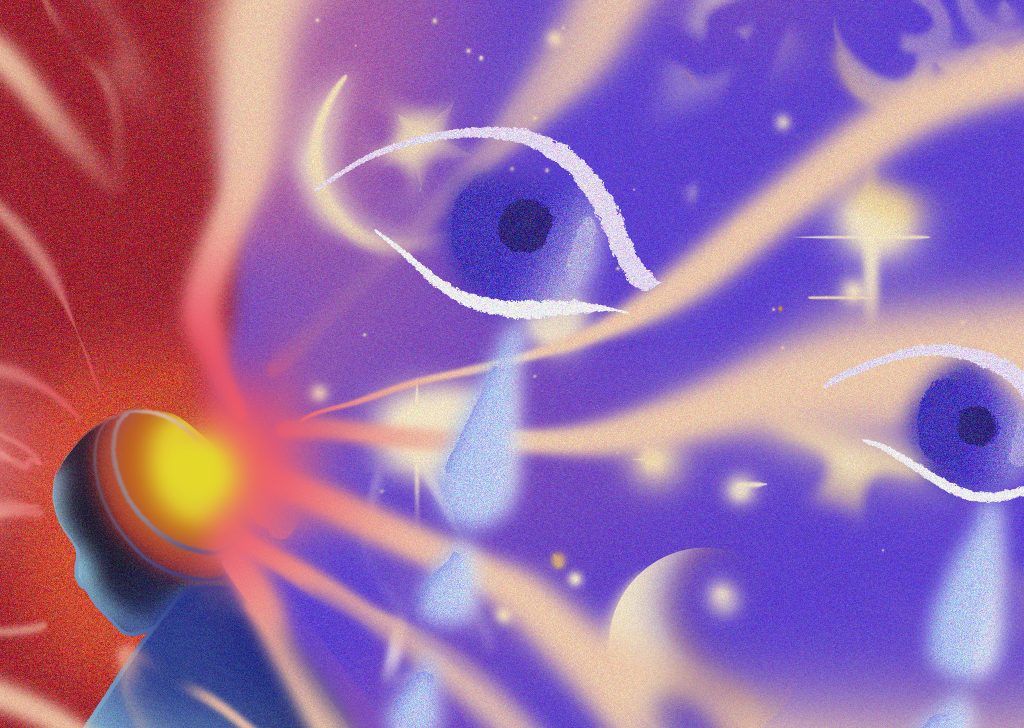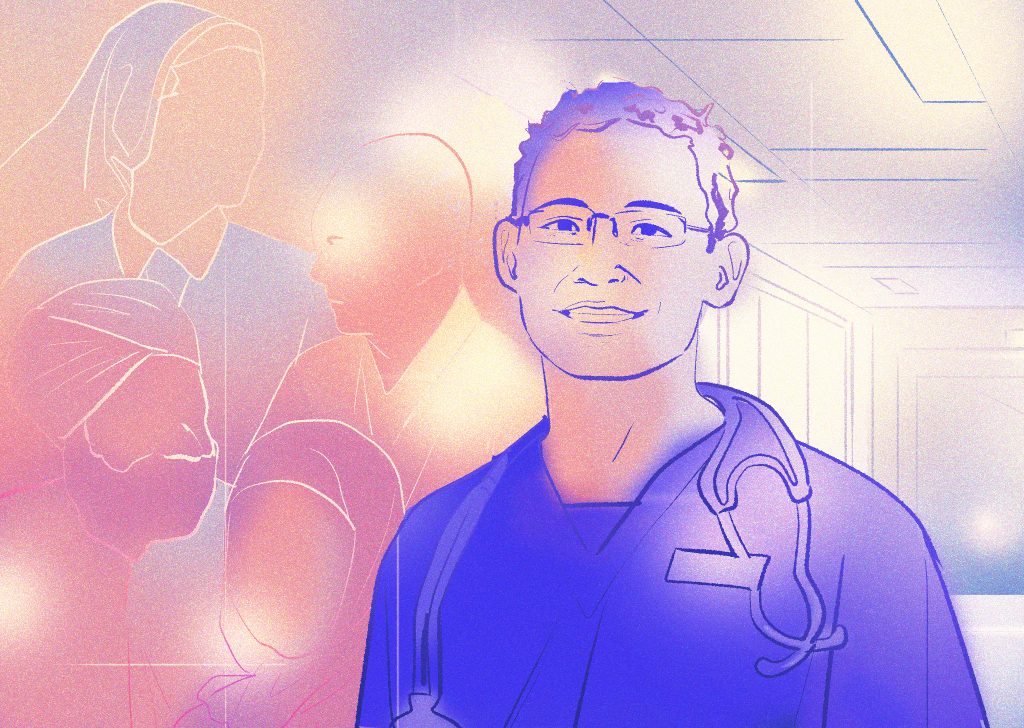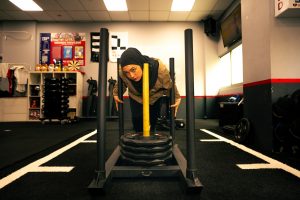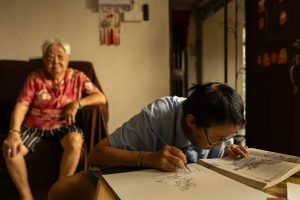All illustrations by Audrey Halim for RICE Media.
While writhing in pain, former secret society members have told Doctor Norhisham Main: “It’s ok, I am suffering because of my transgressions. This is like a cleansing.”
From experience, this palliative care expert knows that staring death in the face can elicit a variety of reactions. Some patients will insist on speaking with a specific faith leader. Others have faced potential medical complications because of their black magic needles—talismans that are supposed to ward off maladies or bring luck, wealth and beauty.
“I remember this family who were worried about a ‘generational spirit’ that their elderly grandparent was keeping, and were afraid that that spirit would be passed to them or their next generation when that family member dies.”
Even though he is a man of science, this family raised this worry to Dr Norhisham nonetheless. A healthcare professional who tries his best to support patients and their families medically and emotionally, Dr Norhisham searched from temple to temple until he found the right cleric to address that uncommon concern.
When patients and families face a challenge of supernatural nature, this tireless physician opines that finding the correct faith leader for them is crucial to them enjoying some serenity. Whether you buy into such rituals and belief systems or not, Dr Norhisham cannot deny the sense of tranquillity that their devotees accrue from them.
Dr Norhisham’s work has exposed him to faith practices and doctrines that few Singaporeans have privy to, and he is happy to talk about the intrinsic link between physiology and spirituality that he has come to witness.
Because when death comes knocking, faith and medicine become intertwined to guide the dying through their final moments.
Holistically Caring for Someone
Dr Norhisham is a Senior Consultant and Head of Ng Teng Fong General Hospital’s Division of Supportive Care & Palliative Medicine and is the Group Lead for Palliative Care in the National University Health System.
When he sets out every morning to visit patients in public hospital wards, hospices, community hospitals and nursing homes, his priority is to ensure that their medical needs are met. His other main objective is to alleviate their symptoms as best he can so that they can hopefully manage some of their day-to-day tasks.
“Palliative care supports patients through serious illnesses and helps them get back to their daily lives,” Dr Norhisham explains.
“Palliative care is different from end-of-life care. End-of-life care is meant to minimise the effects experienced by a person who is deteriorating and facing death soon. Their time is short, so we help them achieve what they want, including things they want to do but haven’t.”
He highlights that palliative care patients might experience effects not just from an illness but also suffer side effects of treatments.
Those who are less sentient or less medically literate become well aware of the severity of the situation when they see their bodies withering away, Dr Norhisham points out.
During these bleak episodes, patients might develop burning questions and concerns of a spiritual nature.
“Besides physical pain, many feel emotional and spiritual distress. Sometimes they share and express their spiritual needs. They ask us questions like if God really exists.”

Spirituality’s Impact on Pain
As a palliative care doctor who prioritises supporting his patients as best he can, Dr Norhisham doesn’t mind going out of his way to fulfil his patients’ assortment of requests. This might be surprising to some, but the good doctor feels that doing so is imperative. Some people say that your life flashes before your eyes when you are near death, and Dr Norhisham confirms this.
“Patients share with us that many different thoughts and memories run through their minds whenever they start thinking about death. I would like these patients to experience a sense of inner peace,” says Dr Norhisham, who explains how spiritual well-being may positively influence a patient’s journey.
He remembers cases when palliative patients appeared to have a low threshold for pain but felt better when their spiritual problems were addressed.
“I had a patient who reported a pain score of 10 out of 10. He was not in serious visible distress and did not appear to be an attention-seeker, so we wondered why he was reporting such an exaggerated pain score.”
From speaking with the patient, Dr Norhisham realised that beyond physical pain, the patient also had spiritual concerns, so Dr Norhisham sought out and invited a faith leader from that patient’s religion to visit him. After this patient’s spiritual needs were met, he reported a lower pain score.
“I am medically trained to treat patients, but some patients need spiritual healing, too,” he observes.
“In our post-Covid world, there is now a greater awareness about mental wellness and spiritual needs.”
He is thankful that society is becoming more open about the role of spirituality and pastoral care in wellness—he knows how difficult it is for patients to navigate tough times and undergo gauntlets of treatments without emotional and spiritual support.
Questions That Stump Doctors
As a healthcare veteran who has received training at various renowned universities, Dr Norhisham nonetheless acknowledges when a certain question is more suitable for a clergyman than a doctor to answer.
As the President of the Muslim Healthcare Professionals Association, Dr Norhisham strives to increase health literacy about preventable diseases in the Malay-Muslim community.
As a Muslim himself, he tries his best to address the questions of fellow Muslims, especially those in palliative care or end-of-life care.
“When some Muslim patients can no longer perform prayers or go on pilgrimages, they feel distressed. They might ask questions about how they can still practise their faith and contribute to Islam, or whether certain medicines are halal or haram.”
Dr Norhisham usually engages an asatizah (Muslim religious teacher) to reply to these questions from Muslim patients, as these matters are within the purview of these religious authority figures.
“Some Muslim patients also feel that their illnesses are preventing them from going on a pilgrimage, akin to a punishment for their sins,” he shares. “Others insist on going on a pilgrimage and don’t mind if they die there—because it would mean dying on holy land.”
Dr Norhisham says that he takes great care when addressing such a sensitive topic. He is in touch with the leaders of different religions, who help him find the right clerics for respective patients.

Addressing a Melting Pot of Religious Needs
Singapore’s tapestry of cultures and beliefs is more diverse than we can imagine.
While chaplains in healthcare used to be mostly Christian, Dr Norhisham notes that chaplains from various major religions now frequent hospitals, hospices, and other domains of palliative care.
When training new staff, he encourages them to learn more about the country’s major religions by referring them to the Inter-religious Organisation, Singapore (IRO). However, his diverse array of palliative care patients has exposed him to the vast spectrum of religious practices that can be found in Singapore, which span far beyond the IRO’s online literature.
“I’ve seen patients who use charm needles,” divulges Dr Norhisham. His change in tone recalls the confusion that he felt in such situations. “Charm needles are a practice that has not been common for the past 60 years.”
Charm needles, known among the Malay community as ‘susuk’, are needles that believers pierce into their bodies, believing that this will bring them health and fortune.
When a palliative care patient has questions about a rare ritual, Dr Norhisham might have to search high and low to find the right religious leader to answer them.
Rituals like the insertion of charm needles complicate matters. Physicians have to take them into consideration when performing medical procedures like magnetic resonance imaging (MRI), for example, because an MRI can cause these sharp objects in the body to migrate.
“Some patients also wonder if their charm needles conflict with their faith. Removal of their charm needles might not be possible, so I have had to find suitable faith leaders to address their questions about their charm needles.”
The case of the ‘generational spirit’ emphasised to Dr Norhisham that the spiritual needs of patients’ families are no less important because family members are often the decision-makers for palliative care patients. They bear the burden of making critical decisions for relatives who might be half-lucid or not lucid at all. Dr Norhisham and the team do their best to help put their worries at ease.
Fortunately for the family with the generational spirit, they managed to connect with a subject matter expert who helped them resolve the issue.
“They felt relieved after they were able to close that chapter in their family history,” he reveals.
Even people who do not profess any religion have spiritual needs that play into the healing process.
“When a patient does not belong to any religion, I will ask them what gave them strength during past crises.”
These answers then give Dr Norhisham an idea of how to emotionally support that individual during a critical period when inner tranquillity has the power to alleviate symptoms.
Perhaps physical needs are just as important as spiritual needs. Although Western medicine hardly accepts or explains religious practices, Dr Norhisham goes above and beyond to fulfil his patients’ spiritual requests because he empathises with patients and their families’ desire for some peace of mind.






